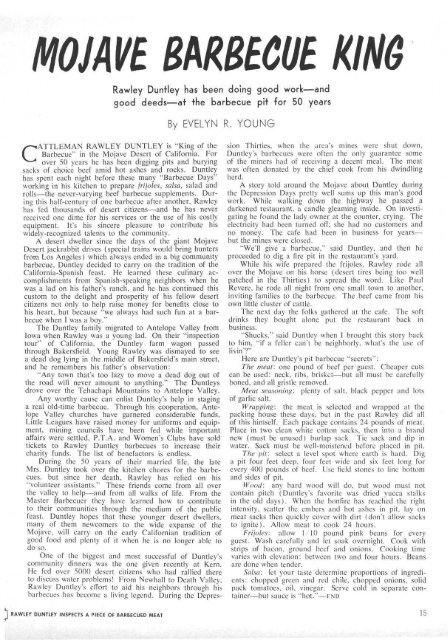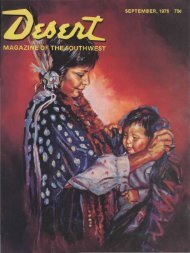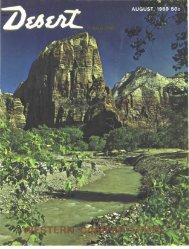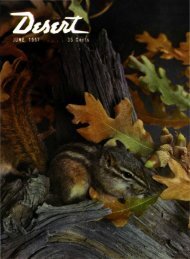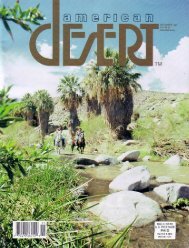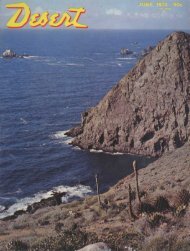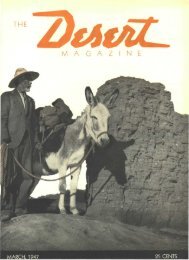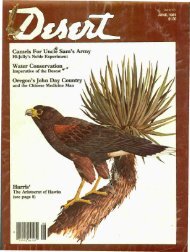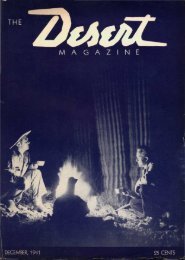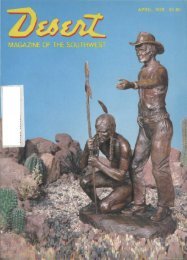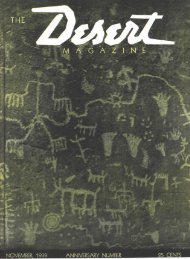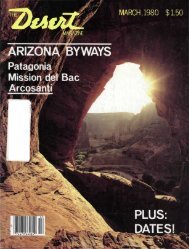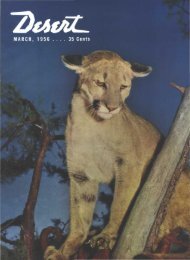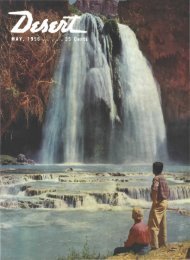Continued - Desert Magazine of the Southwest
Continued - Desert Magazine of the Southwest
Continued - Desert Magazine of the Southwest
You also want an ePaper? Increase the reach of your titles
YUMPU automatically turns print PDFs into web optimized ePapers that Google loves.
MOJAVE BARBECUE KING<br />
Rawley Duntley has been doing good work—and<br />
good deeds—at <strong>the</strong> barbecue pit for 50 years<br />
By EVELYN R. YOUNG<br />
CATTLEMAN RAWLEY DUNTLEY is "King <strong>of</strong> <strong>the</strong><br />
Barbecue" in <strong>the</strong> Mojave <strong>Desert</strong> <strong>of</strong> California. For<br />
over 50 years he has been digging pits and burying<br />
sacks <strong>of</strong> choice beef amid hot ashes and rocks. Duntley<br />
has spent each night before <strong>the</strong>se many "Barbecue Days"<br />
working in his kitchen to prepare frijoles, salsa, salad and<br />
rolls—<strong>the</strong> never-varying beef barbecue supplements. During<br />
this half-century <strong>of</strong> one barbecue after ano<strong>the</strong>r, Rawley<br />
has fed thousands <strong>of</strong> desert citizens—and he has never<br />
received one dime for his services or <strong>the</strong> use <strong>of</strong> his costly<br />
equipment. It's his sincere pleasure to contribute his<br />
widely-recognized talents to <strong>the</strong> community.<br />
A desert dweller since <strong>the</strong> days <strong>of</strong> <strong>the</strong> giant Mojave<br />
<strong>Desert</strong> jackrabbit drives (special trains would bring hunters<br />
from Los Angeles) which always ended in a big community<br />
barbecue, Duntley decided to carry on <strong>the</strong> tradition <strong>of</strong> <strong>the</strong><br />
California-Spanish feast. He learned <strong>the</strong>se culinary accomplishments<br />
from Spanish-speaking neighbors when he<br />
was a lad on his fa<strong>the</strong>r's ranch, and he has continued this<br />
custom to <strong>the</strong> delight and prosperity <strong>of</strong> his fellow desert<br />
citizens not only to help raise money for benefits close to<br />
his heart, but because "we always had such fun at a barbecue<br />
when I was a boy."<br />
The Duntley family migrated to Antelope Valley from<br />
Iowa when Rawley was a young lad. On <strong>the</strong>ir "inspection<br />
tour" <strong>of</strong> California, <strong>the</strong> Duntley farm wagon passed<br />
through Bakersfield. Young Rawley was dismayed to see<br />
a dead dog lying in <strong>the</strong> middle <strong>of</strong> Bakersfield's main street,<br />
and he remembers his fa<strong>the</strong>r's observation:<br />
"Any town that's too lazy to move a dead dog out <strong>of</strong><br />
<strong>the</strong> road will never amount to anything." The Duntleys<br />
drove over <strong>the</strong> Tehachapi Mountains to Antelope Valley.<br />
Any worthy cause can enlist Duntley's help in staging<br />
a real old-time barbecue. Through his cooperation, Antelope<br />
Valley churches have garnered considerable funds,<br />
Little Leagues have raised money for uniforms and equipment,<br />
mining councils have been fed while important<br />
affairs were settled, P.T.A. and Women's Clubs have sold<br />
tickets to Rawley Duntley barbecues to increase <strong>the</strong>ir<br />
charity funds. The list <strong>of</strong> benefactors is endless.<br />
During <strong>the</strong> 50 years <strong>of</strong> <strong>the</strong>ir married life, <strong>the</strong> late<br />
Mrs. Duntley took over <strong>the</strong> kitchen chores for <strong>the</strong> barbecues,<br />
but since her death, Rawley has relied on his<br />
"volunteer assistants." These friends come from all over<br />
<strong>the</strong> valley to help—and from all walks <strong>of</strong> life. From <strong>the</strong><br />
Master Barbecuer <strong>the</strong>y have learned how to contribute<br />
to <strong>the</strong>ir communities through <strong>the</strong> medium <strong>of</strong> <strong>the</strong> public<br />
feast. Duntley hopes that <strong>the</strong>se younger desert dwellers,<br />
many <strong>of</strong> <strong>the</strong>m newcomers to <strong>the</strong> wide expanse <strong>of</strong> <strong>the</strong><br />
Mojave, will carry on <strong>the</strong> early Californian tradition <strong>of</strong><br />
good food and plenty <strong>of</strong> it when he is no longer able to<br />
do so.<br />
One <strong>of</strong> <strong>the</strong> biggest and most successful <strong>of</strong> Duntley's<br />
community dinners was <strong>the</strong> one given recently at Kern.<br />
He fed over 5000 desert citizens who had rallied <strong>the</strong>re<br />
to discuss water problems! From Newhall to Death Valley,<br />
Rawley Duntley's effort to aid his neighbors through his<br />
barbecues has become a living legend. During <strong>the</strong> Depres-<br />
RAWLEY DUNTLEY INSPECTS A PIECE OF BARBECUED MEAT<br />
sion Thirties, when <strong>the</strong> area's mines were shut down,<br />
Duntley's barbecues were <strong>of</strong>ten <strong>the</strong> only guarantee some<br />
<strong>of</strong> <strong>the</strong> miners had <strong>of</strong> receiving a decent meal. The meat<br />
was <strong>of</strong>ten donated by <strong>the</strong> chief cook from his dwindling<br />
herd.<br />
A story told around <strong>the</strong> Mojave about Duntley during<br />
<strong>the</strong> Depression Days pretty well sums up this man's good<br />
work. While walking down <strong>the</strong> highway he passed a<br />
darkened restaurant, a candle gleaming inside. On investigating<br />
he found <strong>the</strong> lady owner at <strong>the</strong> counter, crying. The<br />
electricity had been turned <strong>of</strong>f; she had no customers and<br />
no money. The cafe had been in business for years—<br />
but <strong>the</strong> mines were closed.<br />
"We'll give a barbecue," said Duntley, and <strong>the</strong>n he<br />
proceeded to dig a fire pit in <strong>the</strong> restaurant's yard.<br />
While his wife prepared <strong>the</strong> frijoles, Rawley rode all<br />
over <strong>the</strong> Mojave on his horse (desert tires being too well<br />
patched in <strong>the</strong> Thirties) to spread <strong>the</strong> word. Like Paul<br />
Revere, he rode all night from one small town to ano<strong>the</strong>r,<br />
inviting families to <strong>the</strong> barbecue. The beef came from his<br />
own little cluster <strong>of</strong> cattle.<br />
The next day <strong>the</strong> folks ga<strong>the</strong>red at <strong>the</strong> cafe. The s<strong>of</strong>t<br />
drinks <strong>the</strong>y bought alone put <strong>the</strong> restaurant back in<br />
business.<br />
"Shucks," said Duntley when I brought this story back<br />
to him, "if a feller can't be neighborly, what's <strong>the</strong> use <strong>of</strong><br />
livin'?"<br />
Here are Duntley's pit barbecue "secrets":<br />
The meat: one pound <strong>of</strong> beef per guest. Cheaper cuts<br />
can be used: neck, ribs, brisket—but all must be carefully<br />
boned, and all gristle removed.<br />
Meat seasoning: plenty <strong>of</strong> salt, black pepper and lots<br />
<strong>of</strong> garlic salt.<br />
Wrapping: <strong>the</strong> meat is selected and wrapped at <strong>the</strong><br />
packing house <strong>the</strong>se days, but in <strong>the</strong> past Rawley did all<br />
<strong>of</strong> this himself. Each package contains 24 pounds <strong>of</strong> meat.<br />
Place in two clean white cotton sacks, <strong>the</strong>n into a brand<br />
new (must be unused) burlap sack. Tie sack and dip in<br />
water. Sack must be well-moistened before placed in pit.<br />
The pit: select a level spot where earth is hard. Dig<br />
a pit four feet deep, four feet wide and six feet long for<br />
every 400 pounds <strong>of</strong> beef. Use field stones to line bottom<br />
and sides <strong>of</strong> pit.<br />
Wood: any hard wood will do, but wood must not<br />
contain pitch (Duntley's favorite was dried yucca stalks<br />
in <strong>the</strong> old days). When <strong>the</strong> bonfire has reached <strong>the</strong> right<br />
intensity, scatter <strong>the</strong> embers and hot ashes in pit, lay on<br />
meat sacks <strong>the</strong>n quickly cover with dirt (don't allow sacks<br />
to ignite). Allow meat to cook 24 hours.<br />
Frijoles: allow 1 10 pound pink beans for every<br />
guest. Wash carefully and let soak overnight. Cook with<br />
strips <strong>of</strong> bacon, ground beef and onions. Cooking time<br />
varies with elevation: between two and four hours. Beans<br />
are done when tender.<br />
Salsa: let your taste determine proportions <strong>of</strong> ingredients:<br />
chopped green and red chile, chopped onions, solid<br />
pack tomatoes, oil, vinegar. Serve cold in separate container—but<br />
sauce is "hot."—F.ND<br />
15


